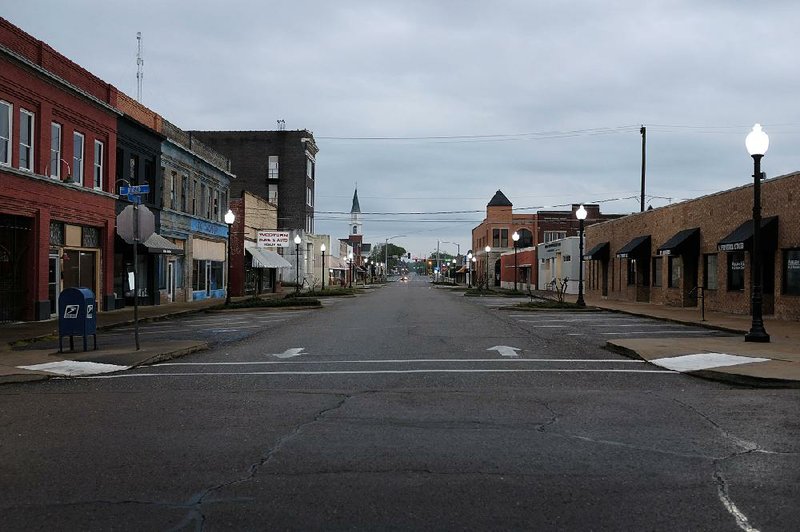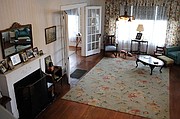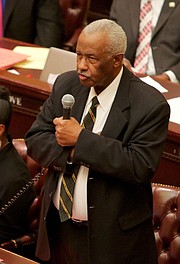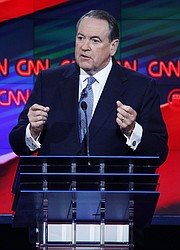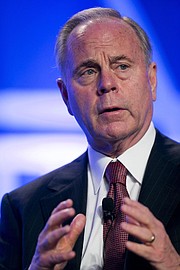HOPE -- People ask what's in the water at Hope.
The Hempstead County seat has produced an inordinate number of famous people.
In politics, there was President Bill Clinton and Gov. Mike Huckabee.
Two well-known people from the Clinton White House, Chief of Staff Thomas F. "Mack" McLarty and Deputy White House Counsel Vincent Foster Jr., were from that city.
Hope was home to the artist Effie Anderson Smith and performer Ketty Lester.
Other famous people from Hope include state Rep. John Walker, the civil-rights attorney; Dorothy McFadden Hoover, a pioneer in the field of aeronautical mathematics and research; and Paul W. Klipsch, who made his first Klipschorn speaker in a tiny tin shed in Hope in 1946.
Hope, perhaps, is most famous for world-champion watermelons and its annual watermelon festival.
"We sometimes joke that it was not the water but the watermelon in Hope," said Huckabee, speculating on the magic potion that produced so many noteworthy people.
But what makes Hope special is hard to explain.
"I don't have a perfect answer," McLarty said. "I don't quite know what the magic potion was."
At an April 6 event in Hope, Clinton remembered his boyhood there.
"What we had here was gospel singing, square dancing, the county fair and storytelling," Clinton told the crowd at Hempstead Hall.
Clinton said he was blessed to be raised in a small town before "television culture."
In a National Park Service video about his birthplace home in Hope, Clinton says "I believe if I'd been born in a bigger place 10 years later, I'd probably never have become president."
He credited community.
"Everybody's got a job to do," Clinton said. "Everybody had a role to play. And we all did better when we work together."
Hope was a railroad town, named for the daughter of the railroad company's land commissioner.
The first passenger train pulled into "Hope Station" on Feb. 1, 1872, according to the Encyclopedia of Arkansas History & Culture.
Nothing in Hope's early history makes it seem particularly special.
Hope's economy has always depended on farming, according to the encyclopedia.
"Cotton was the chief crop until the 1920s," according to the article by Mary Nell Turner. "More diversified farming began to be encouraged when the University of Arkansas Experiment Station was established near Hope in 1930."
The poultry industry also provides jobs in Hempstead County.
McLarty, 72, said other Arkansas towns produced famous people -- like Camden, which is 50 miles to the east. U.S. Sens. David Pryor and John McClellan came from Camden.
But no other small town in Arkansas seems to have generated as much talent as Hope.
"About as close as I can get to it is there was a sense of community when the president and Joe Purvis and I were growing up," McLarty said.
Purvis, also 72, is a Little Rock lawyer who graduated from Hope High School with McLarty in 1964.
"It was really a very, very special place," Purvis said. "To me it seemed like just the greatest place in the world to grow up. It was a different time. We've made some real technological advances, but I think what we've lost with cellphones and computers is the ability to talk to each other and really communicate."
Purvis said it was the perfect blend of time and place.
"It had a really good community spirit at that time with people working together," he said.
Purvis said the community coalesced around the Hope High School football team in the early 1960s. Home games were sellouts, he said.
"There's nothing like winning athletic teams to inspire pride in a community," Purvis said. "I never saw a school rally around an algebra class."
But a school needs good teachers and good extracurricular programs, he said.
He said Hope is different now. Since he graduated from Hope High School, the district desegregated, but many white families send their kids to school in Spring Hill, 7 miles to the southwest.
Purvis said that has frayed the fabric of community in Hope.
"You've got to have a fighting community spirit in your town," he said.
Hope has an estimated population of 9,790. Forty-three percent of its residents are black.
State Rep. John Walker, 81, attended Hope's segregated Yerger High School until 1952, when his family moved to Texas. After graduating from high school in Houston in 1954, he went on to earn degrees from what is now the University of Arkansas at Pine Bluff, New York University and Yale University.
Walker had a somewhat different view of Hope.
"While growing up, I did not perceive it to be special," Walker said. "It was another town where African-Americans lived in small houses, mostly without paved streets, mostly near factories and churches. Our parents were generally laborers, if they worked at all. Labor included chopping and picking cotton, peaches, beans and other fruit."
Walker said Hope had two elementary schools and one high school for black students.
"Our facilities were obviously unequal," he said. "African-Americans were allowed to use the white high school football field once a week during football season, usually on Thursday night. Our schools received the white school's book discards when the white schools got new books."
"White and African-American children who lived in proximity to each other played together and were friendly until they became teens," Walker said. "When whites became teens, they also became Mr. and Mrs., not only to their former playmates but to our parents."
Black students' lives centered on family, school and church, Walker said.
"Our churches were religious, social and educational vessels," he said. "I note that we were taught in the churches almost as much as we were taught in school. Our public school teachers were also our Sunday School teachers."
Walker said few of the black teachers were college graduates. Many of them had finished the 10th grade and were going to summer school at the college in Pine Bluff.
"I recall that from the first grade through the 10th grade, when I left Hope, all of our teachers seemed to care about all of the students," he said. "They were supportive. They were also our protectors away from school as well as within school."
In high school, the curriculum became more advanced.
"We were taught the poetry of many now somewhat forgotten African-American poets, such as Langston Hughes and Countee Cullen," Walker said. "They notably taught preparation for a new day when white people would understand that we too had the same visions, hopes and dreams as our white former playmates who were being told that they had real futures while we were being told otherwise."
Walker said many black people from Hope went on to important careers outside Arkansas.
"I am aware of at least eight African-American persons from Hope who became lawyers and moved away from the state -- an equal number of physicians, and a greater number of persons with doctoral degrees from my era alone," he said.
"You ask what was special about Hope," Walker said. "I guess it is that we were taught to do well, pay attention to learning, and that we were as good as white people and that if we moved away from Arkansas we could reach our potential. Many did."
"Most of the African-American people I grew up with left and did well generally outside the South, more often in California or Michigan. Not much in my opinion has changed except that the schools don't do as well for my people as they did in the early 50s and the jails are now more full of them."
Huckabee, 63, also remembers a sense of community and caring from teachers and mentors in the white community of Hope.
"I grew up as a kid who was poor, but my parents told me that shouldn't hold me back. I might have to work a little harder," Huckabee said.
He did work hard and got a Rotary Club scholarship to attend college.
"It was not just financial, it was deeply emotional, saying 'You're going to be OK. You're going to make it,'" Huckabee recalled. "If you knew the way I grew up, it was a tremendous boost to me."
State Rep. Talbot Field Jr. called Huckabee one day to get a Coke and talk with him about college.
"He knew my parents couldn't talk from a perspective of experience," Huckabee said. "He wanted to help fill in some blanks. I still remember some things he told me in that visit, and that was 46 years ago."
Among other things, Talbot told Huckabee that college teaches the tools so you'll know how to spend the rest of your life digging for knowledge.
"I think he saw some potential in me and just wanted to help and encourage me," Huckabee said. "But looking back, I'm truly amazed that he took that time. ... I don't know if that happens all over the country in small towns, but it did there."
Huckabee said he had "extraordinary teachers" in Hope.
"All of them I think genuinely cared."
Huckabee said his parents taught him not to be a victim or to be jealous of other families who might have air conditioning, carpet or the money to take vacations.
"In those days, there were things that separated us from a socioeconomic point of view," he said.
Huckabee remembers hauling hay and catching chickens when he was 8 or 9 years old.
"It was horrible work, but you got a little money for it," he said. "I thought, 'What do I have to do so I don't have to do this for the rest of my life?' I'm by golly going to get an education so I don't have to catch chickens when I'm 50 years old."
Walker also said black children of his generation in Hope wanted to get educations so they didn't have to pick cotton for a living.
Huckabee said the Hope school completely desegregated when he was in the ninth grade. He said a black homecoming queen was elected his senior year of high school.
"At class reunions, it's not uncommon for you to see a total mix of black and white and rich and poor, valedictorians, etc.," Huckabee said. "There was a closeness in the class that was pretty exceptional. ... None of us thought we were better than anyone else."
"There was something unique about Hope, and maybe it was the right community leaders and people in the churches. There was a sense of spiritual community that was very strong."
McLarty said that when he was growing up in Hope, people lived their lives every day "in a pretty exemplary manner and set a good example."
"All of that clearly made an impression on me and on others," he said. "Recognizing the worth and dignity of each individual, that was just ingrained in me and reinforced."
McLarty said many white people also had to leave Hope to pursue their careers. That's normal for people from any small town, he said, but many also stayed in Hope and had successful careers there.
"I don't think that's particular to Hope," McLarty said. "What you do see is I think everybody senses a connectivity to Hope. I think there was a feeling of community, a sense of civility. The schools were good. I think churches certainly were a part of that order. All those things together.
"I don't think you can say the Hope water had one more drop of a particular mineral in it."
McLarty said he doesn't believe that feeling has slipped away.
"People there love their town in much the same way I just described to you," he said. "I think what is different is the economy and how towns like Hope throughout our country can adapt to that change. Things change over time, but I think there's still that sense of decency and caring. That hasn't changed."
On a recent Sunday morning in Hope, two couples were having breakfast at the McDonald's restaurant.
Doyle Smittle, 80, of Emmet echoed what Walker and McLarty said regarding famous people from Hope.
"The key is they're from Hope, which means they left," said Smittle, who grew up in Hope. "Here, during our growing up, everybody had to go. When they graduate, they had to leave to get a job."
Was there something special in the water?
"Hard times makes tough people," Smittle said. "It was hard times. We were real poor back then, but we didn't know it."
Dorothy Smittle, 78, Doyle's wife, had a couple more "contributing factors" to add: good facilities, community and churches.
"And good people," she said. "People used to be smart enough to get along."
Ricky Glasgow, who was eating at the next table, said some of those famous Hope residents were just born with a great degree of intelligence.
"Inherited from their parents?" a reporter asked.
"Through God," Glasgow said. "That's how it come about."
Metro on 04/21/2019
